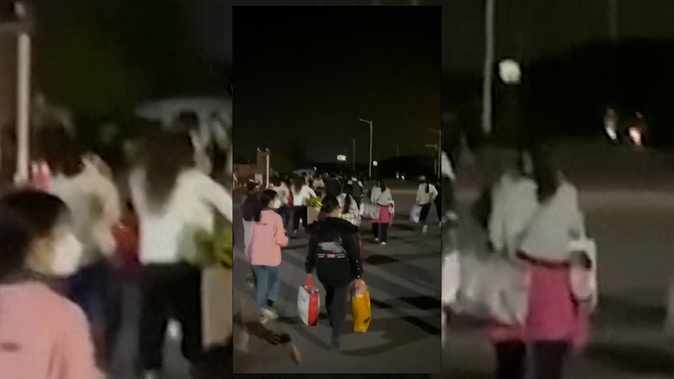They had been prisoners of the production baptized in China as
"closed circuit"
for two weeks .
From the cramped dormitories where the workers, most of them migrants from rural areas, live and eat, to the factory.
And the same route in reverse.
So one day after another, without interaction with the outside world or the possibility of setting foot outside the bubble under threat of confinement.
Rumors were spreading that they were all going to be taken to mega quarantine centers.
Then there were other more surrealists who bet that the Chinese military would use them as an experiment to let the virus spread and see how many died.
Many workers at the world's largest
iPhone
factory bought both rumors.
It was not even known for sure if there were any confirmed positives for Covid at a plant with about
300,000 employees
in Zhengzhou, central China.
But many could not stand the pressure and the accumulation of rumors.
Then the flight began.
Over the weekend, dozens of videos have been posted on national social networks in which Foxconn workers, which manages Apple's largest iPhone assembly factory, are seen running away from the facilities and jumping the enclosure fences.
"
They have us held as criminals
and in subhuman conditions. I do not intend to return to the factory, I am going back to my house," said a woman in one of the videos.
During the day, many would walk through the fields, then go out at night to see if some good Samaritan would pick them up on the road.
Some were lucky.
There were truckers who took many hitchhikers.
What they didn't count on was that
the authorities would eventually find the passengers
and lock them and the volunteer drivers up in quarantine.
Zhengzhou, the capital of Henan province and home to more than 10 million residents, reported fewer than 200 new infections this week.
A sufficiently alarming figure for the local authorities who, following the extreme national Covid zero policy guideline, began to close neighborhoods, block public transport, carry out massive PCR tests and put workers in the industrial zone in a closed circuit between their bedrooms and factories
not to stop production
, a lesson learned from previous outbreaks.
A drop in production of 30%
The problem that Apple has found with these restrictions and the recent exodus of employees is that the production of its Zhengzhou plant could fall by up to 30%.
This is what
Reuters
pointed out on Monday according to internal company sources.
Taiwan-based Foxconn
produces 70% of the
world's iPhone shipments.
The latest data, before the pandemic, in 2019, ensures that the Zhengzhou plant was the third largest exporter in China, sending electronic products worth 32,000 million dollars abroad.
In addition to Zhengzhou, China also has another large factory in the southern city of Shenzhen, which has now accelerated its activity to increase production and make up for the deficit at a crucial time because we are close to the Christmas season, when the demand for products electronics goes off.
"At least 10% of global iPhone production capacity is affected by the situation at the Zhengzhou factory," Kuo Ming-chi, an analyst at TF International Securities, which tracks Apple's supply chain, wrote on Twitter.
Several factory workers told the
Financial Times
that the situation at the plant had gradually deteriorated as the outbreak continued to spread, though they did not know how many positives there were among them, with food and medical supplies running low and
more and more employees locked
in lockdown.
bedrooms for quarantine
After the chaos that broke out at the plant, Foxconn promised that it would start organizing buses that would take the employees who wanted it to their home cities, after passing through a centralized quarantine.
Henan Daily
, a local newspaper, quoted a person in charge of the Foxconn unit responsible for assembling the iPhone 14 series as saying that the plant
desperately needs workers
to support the current peak production season.
Conforms to The Trust Project criteria
Know more
iPhone
China
Coronavirus

